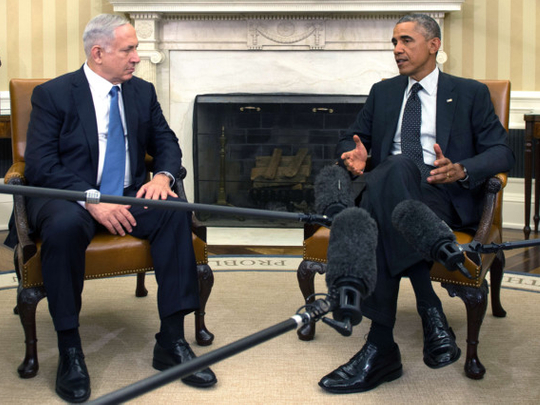
The silence of US President Barack Obama over Israel’s outrageous actions in recent weeks — starting with its merciless attacks against the besieged Gaza Strip, where more than 2,100 were killed, including about 500 children — remains infuriating. Of course, it is common knowledge that on the eve of a Congressional election where, this year, the race is tight between the president’s Democratic Party and the Republicans, no sensible American leader will want to rock the boat. But in this case, foreign policy is not a key issue and the tight races are in a few states where the issues are mostly domestic. Moreover, no one is expecting the president to upturn the situation locally, especially given that his foreign intervention (via air raids by the American air force) against Daesh (Islamic State of Iraq and the Levant) has both national and international support, especially by key Arab Gulf states.
What the Obama administration seems to be failing to see are the chances of a positive impact that a Palestinian-Israeli peace settlement can have in the region. Khalil Jahshan, executive director of the newly-established Arab Centre in Washington, DC, a think-tank focused on US foreign policy in the Middle East, is not very convinced that Obama is willing to take any positive step in this direction.
“Obama is not taking any serious action to pressure Israel to end its occupation of Palestine and make peace with the Palestinians for several reasons,” he argues. “First and foremost, he feels that he has tried and failed to sway Israel. He does not feel he can sustain more political failure at this late stage in his presidency, knowing that [Israeli Prime Minister Benjamin] Netanyahu is not willing to compromise on crucial permanent status issues.” Jahshan, a former professor at George Washington University, added that “the deteriorating situation in the Middle East has diverted his attention, as well as that of his key Arab allies, to larger issues that constitute more immediate threat to US national security interests than the festering Palestine issue”.
Moreover, he went on: “Obama clearly lacks the political skill and will to outmanoeuvre Israel’s supporters in the US, particularly in Congress, where he cannot even muster the votes of his own fellow Democrats should he decide to challenge Netanyahu publicly.” But the recent mediocre performance of Netanyahu at the United Nations General Assembly, and in other media interviews, has diminished his public standing in the US.
The New York Times, always seen as a paper that is supportive of Israel, took the Israeli prime minister to task for “a depressively familiar routine” as when Israel has “given final approval for construction of 2,610 [colony] units in geographically sensitive parts of [occupied] East Jerusalem that will make it harder, perhaps impossible, to reach a two-state solution with the Palestinians”. But New York Times had no suggestions for what Obama could do next since he, as always, left his ineffective “rebukes” of Netanyahu to his junior staff. But shortly thereafter, Sweden took the bold step, slapping most western leaders in the face in the announcement by the leader of Sweden’s new centre-left government, Prime Minister Stefan Lofven, that his government, the first major state of the European Union, will recognise the state of Palestine. More than 130 UN members now recognise the Palestinian state, which, at present, has the status of a “nonmember observer state” of the UN.
Nevertheless, there is no need for Obama to remain handcuffed. After all, he had promised in September 2010 at the US General Assembly that “the world can have an agreement that will lead to the creation of a Palestinian state next year”. More to the point, Obama ought now to consider following the steps former US president Dwight D. Eisenhower took against Israel, Britain and France in 1956 to end the Suez Canal War and stop once and for all Netanyahu’s repulsive obduracy.
George S. Hishmeh is a Washington-based columnist. He can be contacted at ghishmeh@gulfnews.com












